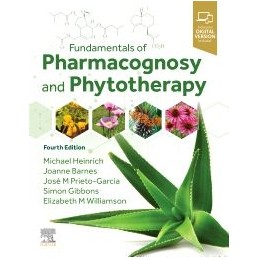- Reduced price

Order to parcel locker

easy pay


 Delivery policy
Delivery policy
Choose Paczkomat Inpost, Orlen Paczka, DHL, DPD or Poczta Polska. Click for more details
 Security policy
Security policy
Pay with a quick bank transfer, payment card or cash on delivery. Click for more details
 Return policy
Return policy
If you are a consumer, you can return the goods within 14 days. Click for more details
Pharmacognosy, the science of nature-derived drugs, pharmaceuticals, and poisons, played a crucial role in the development of modern medicine, and now has an equally important place in healthcare all over the world. This wide scope ranges from traditional medicine systems and herbal and nutritional therapies, the preparation and use of highly standardised and clinically tested herbal medicines, to the production of potent drugs used only in a purified form. Natural sources mainly focus on plants, fungi and algae, but drug discovery of novel compounds and structures includes bacteria and even marine animals.
Fundamentals of Pharmacognosy and Phytotherapy is a landmark textbook that covers this spectrum of medicinal plant use. Written by leading experts in this field, this book takes the reader through the history, identification, and quality assurance of plant-based medicines to their therapeutic properties, safety, and compatibility and interaction with prescribed drugs.
Aimed at students of all healthcare professions, including pharmacy, medicine, nursing and complementary therapies, the comprehensively updated information in this textbook is also relevant to those companies and organisations concerned with the regulation and testing of herbal medicines (phytomedicines), other natural health products, nutraceuticals and dietary supplements.
Data sheet
PART A Fundamentals of Pharmacognosy
SECTION 1 Pharmacognosy and Phytotherapy
1. Importance of Plants in Modern Pharmacy and Medicine
2. Pharmacognosy and Its History: People, Plants and Natural Products
SECTION 2 Medicinal Plant Sciences
3. General Principles of Botany: Morphology and Systematics
4. Plant Families Yielding Important Medicines
5. Ethnobotany and Ethnopharmacology
SECTION 3 Natural Products: An Introduction
6. Natural Product Chemistry
7. Analytical Methods for Natural Products
8. Natural Product Isolation and Structure Elucidation
9. Natural Products With Anticancer and Chemopreventive Effects
10. Antimicrobial Natural Products
SECTION 4 Herbal Medicinal Products
11. The Complex Pharmacology of Herbal Medicines
12. Production, Quality Control and Standardisation of Herbal Medicines
13. Toxicity of Herbal Constituents
14. Herbal Medicine Interactions
15. Regulation and Pharmacovigilance for Herbal Medicines
16. Plants in Traditional Medicine Systems
17. Complementary, Alternative and Integrative Plant Therapies
PART B Important Plant Medicines
18. The Gastrointestinal and Biliary System
19. The Cardiovascular System
20. Weight-Loss Supplements
21. The Respiratory System
22. The Central Nervous System
23. The Musculoskeletal System
24. Female Hormonal and Reproductive Conditions
25. The Male Reproductive System
26. Supportive Therapies for Stress, Ageing, Cancer and Debility
27. Topical Phytotherapy: Skin, Hair, Eye, Ear, Nose and Throat
Reference: 90557
Author: Cecelia E Schmalbach
